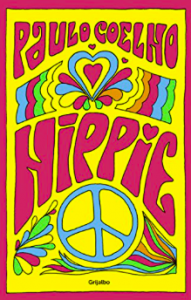Read it Out is a regular column that reviews and recommends books for college students. We delve into a wide array of books that offer guidance, commentary, and perspective of aspects of this exciting, yet confusing time in our lives. We hope that this column not only suggests possible reads, but also allows for our own interpretations and commentary to be used as the first part of the conversation to bond people with shared experiences, feelings, and questions through literature.

image from Amazon Books
Paulo Coehlo’s Hippie was exactly what I needed to pull me out of my mid-January, dreary state of mind. In an instant, Hatcher second floor is transformed into the pulsing 1970s Dam Square. Boys and girls with floral prints and long hair pass in and out following the leads of the “invisible Post” to find the next new location of a far-out, soul discovering experience. The essence of the free spirited communion of people is captured through the character of Paulo, a young Brazilian man, and the woman he met that first day in the square; a woman named Karla who had previously sought out a clairvoyant who assured her she would find a partner to accompany her to Nepal. Paulo and Karla, together, set out on the ‘Magic Bus’ through Europe and Central Asia in a journey of finding the answers they need to begin the start of their lives.
Coehlo’s novel is autobiographical and his story is one that taps into the very feelings associated with those entering this pivotal time of adolescence transforming into adulthood. Paulo and Karla’s pursuit of exploration is garnished with acquired wisdom of finding comfort in uncertainty, and meaning in things that surpass the superficial metrics that we have bound ourselves to. The setting of post-1960s social revolution, mixed with the impending fear of the draft and war, strikes a familiar chord in the reader as we see a reflective vision of our own lives. Paulo states that it was “a time already forgotten and yet still present wishing to be remembered and discovered anew.” So, as we sit fearful of our current 2020 tensions with Iran, climate change becoming a more imminent threat, and social media catalyzing a social revolution in itself- we can connect to the whirlwind feelings of this past generation. Whether walking up South State Street, or the hills of Machu Picchu, the teachings of Coehlo comfort us in a time of uncertainty in what we’re doing, who we want to be, and what the future holds for us. He reminds us of the beauty in being this age; that it truly is the time we begin deciding how we want to live, and they are choices unique and individual to us. He simply puts, “take risks now, when you still have your health and some courage” and although this doesn’t require a one-way ticket on a rickety bus through spiritual sites, it can be defined as a moment in our life to explore possibilities.
I’m not trying to make this seem like this cult-classic, join-the-hippie-movement recommendation, but rather to express the personal enjoyment and comfort I received from reading Hippie. Whether on the “Death train to Bolivia” or sitting in the Law Library at 11pm on a Tuesday, this age in our lives begins the search for understanding who we are, and who we want to be. Did part of me have the thoughts race through my mind to drop everything and become a world-traveling hippie seeking enlightenment? Ok yes, but it was fast and fleeting. What this book did however was comfort me through the realization that there is beauty in the uncertainty of life. The moments and things that are the most worthwhile, “happen without planning or expectations.” Hippie gave me the chance to catch my breath, and for a brief moment in the rush of it all, feel that spark of a true hippie, that everything is going to be all good.

